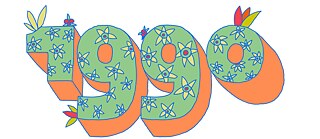After the end of the "Neue Deutsche Welle" (New German Wave; NDW), interest in German-language bands that feel vaguely committed to an "indie" concept was rather limited for a long time. This only changed again in the early 1990s with what was known as the "Hamburg School", which included the band Blumfeld.
Soundtracks
With eight German-language songs from eight decades, music journalist Mario Lasar sheds some light on important cultural and social phenomena in (West) German post-war history.
Most of the songs and artists mentioned in this series can be listened to (in order of mention) in a Spotify playlist: open.spotify.com/playlist/soundtracksBRD/
Although Kolossale Jugend disbanded again after a short time in 1991, the band is considered a pioneer of the “school”. Their LP Heile Heile Boches, which was released in 1989, reignited the need for German-language indie rock that could develop into a more mainstream scene. It was into this climate that Blumfeld released the single Ghettowelt in autumn 1991, with lyrics over a grey guitar backing that formulated a theory of music functioning as a wall with which one protects oneself from the outside world.
On their first two LPs Ich-Maschine and L'État Et Moi, Blumfeld largely continued their approach of combining (self-)reflective lyrics with brittle, energetic indie rock. The album Old Nobody, released in 1999, then marked a turning point that added new impetus to the band’s formerly traditional orientation – an impetus especially noticeable in Tausend Tränen Tief, which was also released as a single. The track is based on acoustic rather than electric guitars, as well as broad synth sphere sounds. The elegiac tempo defines the song as a ballad. In addition, frontman Jochen Distelmeyer steps away from his unrounded, bombastic performance approach to present himself quite assertively in the style of George Michael.
The fact that Blumfeld have softened their old identity indicates the extent to which the band was willing to destabilize aesthetic boundaries. This openness is continued in the lyrics. The line “Es könnte viel bedeuten” (It could mean a lot) refers to the song itself, which indicates its capacity to be interpreted in principle. In parallel with modernity, Tausend Tränen Tief deviates from the idea that language can reflect reality directly. The song “singt für dich allein von neuen Möglichkeiten” (sings of new possibilities for you alone), the speaker tells us. In view of the release date of Tausend Tränen Tief, the emphasis on “Möglichkeitssinn” (sense of possibility) – Robert Musil – can be interpreted as a reference to a frozen perspective on the imminent new millennium.
The use of terms like “schweben” (float) and "fließen” (flow) in the lyrics suggests that the new millennium is not perceived as a fracture, but as a hinge connecting the old with the new. “So wie du ein Teil von mir / bin ich ein Teil von dir” (Just like you're a part of me / I'm a part of you), the lyrics say – and even if it is really supposed to mean two lovers, it can be read in such a way that the lines describe a contact zone between two periods of time. By accentuating smooth transitions, the track is the opposite of Prince's party anthem 1999, which focuses on an interlude orchestrated with much pomp and ceremony. While Prince was only able to influence the mood of transition at the time his song was written in the early 80s as a projection of the future, the Blumfeld track depicts its impressions synchronously from within the year 1999, where there is an anti-hysterical, wait-and-see calm – a pleasant contrast to the permanent scaremongering surrounding the term "Millenium Bug", which shaped current affairs in 1999.
Soundtracks
- 1950s: Just don’t overdo it with the freedom! (Fred Bertelmann – "Der lachende Vagabund")
- 1960s: A poetic moral portrait of class society (Franz Josef Degenhardt – "Spiel nicht mit den Schmuddelkindern")
- 1970s: An unusual alliance between green politics and Schlager hits (Udo Jürgens – "Tausend Jahre sind ein Tag")
- 1980s: Concrete and neon lights (Joachim Witt – "Der Goldene Reiter")
- 1990s: Of new possibilities (Blumfeld – "Tausend Tränen Tief")
- 2000s: When things are worth more than people (Die Goldenen Zitronen – „Wenn ich ein Turnschuh wär“)
- 2010s: Great cinema? (Helene Fischer – "Atemlos durch die Nacht")
- 2020s: A new power structure of gender roles (Christin Nichols – "Bodycount")
The publication of this article is part of PERSPECTIVES - the new label for independent, constructive, multi-perspective journalism. >>> To know more about PERSPECTIVES
05/2024
